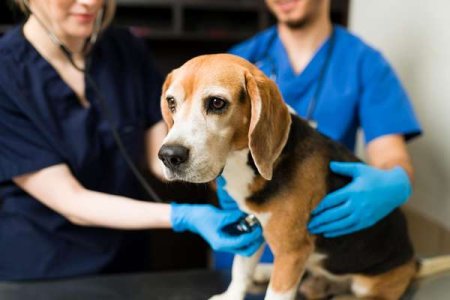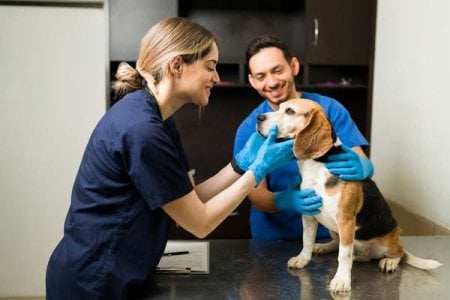Are your pets in danger? Shocking discovery reveals suffocation risk from common plastic food packets
At the Seniors Discount Club, we deeply value not just our members but also their adored furry companions! We're well aware that pets hold an irreplaceable spot in our families. That's why today, we're dedicating some time to shed light on a critical warning that all pet owners across Australia need to heed.
You might not give it a second thought, but something as ordinary as a plastic food packet could prove fatal to your beloved pets, no matter their size. It's a household risk that flies under the radar but one we need to understand and act upon to keep our pets safe.

'Empty bags are attractive to dogs and cats because they retain the smells and tastes of food residues,' RSPCA NSW Chief Veterinarian Dr Liz Arnott shared with 7NEWS.com.au. 'Once the animal’s head is inside the bag, inhalation can cause the bag to seal around their nose and mouth, leading to suffocation.'
It's alarming that an array of everyday plastic food containers could threaten the safety of our pets, from chip or snack bags to cereal box liners and even something as commonplace as bread bags. What amplifies this concern is that a lot of pet owners remain oblivious to this silent threat lurking within their own homes.
'It makes sense that this would pose a suffocation risk,' Victoria RSPCA Chief Vet Dr Bronwyn Oke agreed. 'Especially when you’ve got those small, narrow snouts, and they’re going into things like chip packets or anything that’s been opened. It is a real danger.'
When animals become trapped, Dr Oke explained that they instinctively go into a fight response.
'So there’s a panic, and they’re not thinking... they’re not thinking logically about how to get the bag off their head. And they start breathing faster and faster, pulling in the plastic closer to their mouth, and all the actual oxygen becomes absorbed, and they can suffocate that way.'
Not only veterinarians but also fellow pet owners are sounding the alarm on this matter. One such advocate, operating under the social media handle @Bite-Sized Vet Guides on social media, has echoed this sentiment.
They've implored others to exercise caution with the plea: 'Don't leave food unattended at all but especially not bagged food. And split those bags before you put them in the [rubbish].' It's a simple, proactive measure we can all take to safeguard our furry companions.
A vigilant approach to storing and disposing of these plastic bags is essential, and Dr Arnott shared some valuable advice for keeping our beloved pets safe.
'Most of the reported cases of suffocation occurred by pets accessing bags near the [rubbish], on kitchen surfaces, coffee tables, and counters. So ensuring you always securely store packaging in pet-proof bins or in cupboards and drawers will remove the risk. An extra precaution, before disposing of a bag, is to tie it in a knot or cut it open so that the head of an animal cannot get trapped within.'
The key point to remember is to never underestimate the explorative or hungry nature of your pet. In essence, it's essential to ensure that all items that could potentially pose a risk are kept out of their reach.

'Storing food in cupboards or drawers rather than on the counter is essential,' Dr Arnott concluded. 'Tipping the food into a container with a secure lid can prevent access as well as keep the food fresh. But if you do so, dispose of the bag thoughtfully.'
Moreover, Dr Oke imparts a vital piece of advice to pet owners: if you suspect your pet has encountered any danger, prompt action is crucial. Reach out to your local veterinarian immediately. Watch your pet closely for symptoms like trembling, vomiting, diarrhoea, or even seizures. It's also vital to remember that pet CPR and first aid can potentially be a lifesaver in such scenarios.
 For comprehensive insights into pet-friendly foods and strategies to shield your pets from potential dangers, the RSPCA Knowledge Base serves as an excellent guide. After all, prevention invariably outweighs cure, and our collective aim is to ensure our pets lead secure, joyful lives.
For comprehensive insights into pet-friendly foods and strategies to shield your pets from potential dangers, the RSPCA Knowledge Base serves as an excellent guide. After all, prevention invariably outweighs cure, and our collective aim is to ensure our pets lead secure, joyful lives.
Members, we'd love to hear about your personal experiences as a pet owner. Do you have any unique practices or tips that you've found useful in ensuring your pet's safety and well-being? Your insights could potentially help other members of our community safeguard their own cherished companions.
You might not give it a second thought, but something as ordinary as a plastic food packet could prove fatal to your beloved pets, no matter their size. It's a household risk that flies under the radar but one we need to understand and act upon to keep our pets safe.

A cautionary message is being issued to pet owners in Australia regarding an often-overlooked peril found in many households. Image from Shutterstock
'Empty bags are attractive to dogs and cats because they retain the smells and tastes of food residues,' RSPCA NSW Chief Veterinarian Dr Liz Arnott shared with 7NEWS.com.au. 'Once the animal’s head is inside the bag, inhalation can cause the bag to seal around their nose and mouth, leading to suffocation.'
It's alarming that an array of everyday plastic food containers could threaten the safety of our pets, from chip or snack bags to cereal box liners and even something as commonplace as bread bags. What amplifies this concern is that a lot of pet owners remain oblivious to this silent threat lurking within their own homes.
'It makes sense that this would pose a suffocation risk,' Victoria RSPCA Chief Vet Dr Bronwyn Oke agreed. 'Especially when you’ve got those small, narrow snouts, and they’re going into things like chip packets or anything that’s been opened. It is a real danger.'
When animals become trapped, Dr Oke explained that they instinctively go into a fight response.
'So there’s a panic, and they’re not thinking... they’re not thinking logically about how to get the bag off their head. And they start breathing faster and faster, pulling in the plastic closer to their mouth, and all the actual oxygen becomes absorbed, and they can suffocate that way.'
Not only veterinarians but also fellow pet owners are sounding the alarm on this matter. One such advocate, operating under the social media handle @Bite-Sized Vet Guides on social media, has echoed this sentiment.
They've implored others to exercise caution with the plea: 'Don't leave food unattended at all but especially not bagged food. And split those bags before you put them in the [rubbish].' It's a simple, proactive measure we can all take to safeguard our furry companions.
A vigilant approach to storing and disposing of these plastic bags is essential, and Dr Arnott shared some valuable advice for keeping our beloved pets safe.
'Most of the reported cases of suffocation occurred by pets accessing bags near the [rubbish], on kitchen surfaces, coffee tables, and counters. So ensuring you always securely store packaging in pet-proof bins or in cupboards and drawers will remove the risk. An extra precaution, before disposing of a bag, is to tie it in a knot or cut it open so that the head of an animal cannot get trapped within.'
The key point to remember is to never underestimate the explorative or hungry nature of your pet. In essence, it's essential to ensure that all items that could potentially pose a risk are kept out of their reach.

Pet owners in Australia are being advised about a potential danger lurking in their homes that is not widely known. Image from Shutterstock
'Storing food in cupboards or drawers rather than on the counter is essential,' Dr Arnott concluded. 'Tipping the food into a container with a secure lid can prevent access as well as keep the food fresh. But if you do so, dispose of the bag thoughtfully.'
Moreover, Dr Oke imparts a vital piece of advice to pet owners: if you suspect your pet has encountered any danger, prompt action is crucial. Reach out to your local veterinarian immediately. Watch your pet closely for symptoms like trembling, vomiting, diarrhoea, or even seizures. It's also vital to remember that pet CPR and first aid can potentially be a lifesaver in such scenarios.
Key Takeaways
- Australian pet owners are being warned about the suffocation risk posed by plastic food packets.
- Veterinarians have seen cases involving chip or snack bags, cereal box liners, and bread bags, which can seal around an animal's nose and mouth, leading to suffocation.
- To minimise risk, pet owners should securely store packaging in pet-proof bins, cupboards, or drawers and tie or cut bags before disposing of them.
- If a pet is suspected of having ingested something harmful, pet owners should contact their local veterinarian and be aware that pet CPR and first aid are options.
Members, we'd love to hear about your personal experiences as a pet owner. Do you have any unique practices or tips that you've found useful in ensuring your pet's safety and well-being? Your insights could potentially help other members of our community safeguard their own cherished companions.







